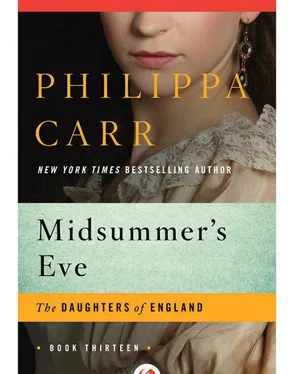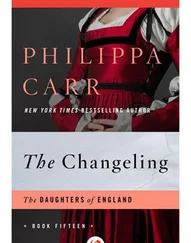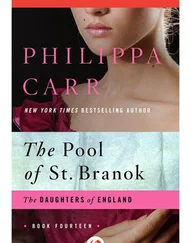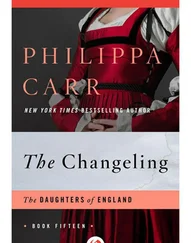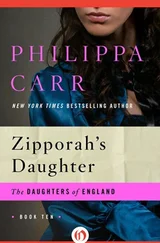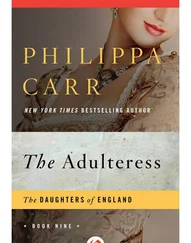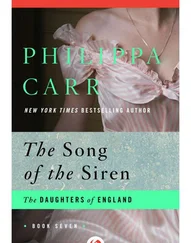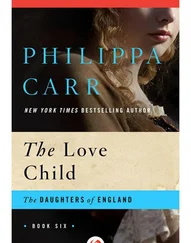I refused to believe he did not know a great deal. “Do let me see the robe,” I cried.
“Here it is.” He opened a drawer and took it out.
“Put it on,” I commanded.
He did. A shiver ran through me as he stood there. I could only describe his appearance as sinister. It was like a monk’s robe—greyish white. The hood was big. It came right over his head and he peered out through the narrow opening in the front. It was only when the hood fell back that his face could be seen.
“There is something frightening about it,” I said.
He pulled back the hood so that it fell right back, and I laughed with relief.
“That’s better. You look like yourself now. In that … with your face hidden you are like a different person.”
“Imagine the effect with several of us dressed like this. Midnight … and those historic stones all around us. Then you get the real atmosphere.”
I said: “It reminds me of the Inquisitors who tortured those they called heretics. Miss Caster and I have been ‘doing’ the Spanish Inquisition. It’s really frightening.”
“I think that is the object. These are not quite so bad as those with pointed tops with slits for eyes. They are really quite spine-chilling. I shall show you some pictures of them.”
“May I try it on?”
“It’s far too big for you. It is made for a tall man.”
“Nevertheless I want to.”
I put it on. It trailed to the floor. Rolf laughed at me.
“Do you know what you’ve done?” he said. “You’ve robbed it of its sinister quality. Annora, you’ll have to grow up.” He looked at me with a tender exasperation. “You’re taking such a long time to do it.”
“I’m taking just the same time as everyone else.”
He put his hands on my shoulders. “It seems a long time,” he said.
He took the robe from me and put it back in the drawer.
“Tell me about Stonehenge,” I said.
I sat at the table with him and he brought books from the shelves to show me. He talked glowingly about the gigantic stones in the midst of the barrows of the Bronze Age. I found it fascinating and it was wonderful to sit beside Rolf at the table while he talked.
That was a very happy afternoon.
There was a great deal of talk about the tragedies. The servants discussed them constantly. When I met Digory in the woods he seemed extremely proud.
“Did your granny kill Jemima and Mrs. Cherry’s baby?” I asked him.
He just pursed his lips and looked secretive.
“She can do anything,” he boasted.
“My father says people shouldn’t say such things.”
He just swung himself up onto a tree and sat there laughing at me. He put his two forefingers to the side of his head, pretending he had horns.
I could not stop thinking of poor Mrs. Cherry and the mare which had to be shot. I ran home as quickly as I could.
Talk went on about Mother Ginny and then it ceased to be the main topic of conversation and I forgot about it.
One morning when I went down to breakfast I knew something had happened. My parents were in deep conversation.
“I must go at once,” my mother was saying. “You do see that, Jake.”
“Yes, yes,” said my father.
“Even now I may not be in time. I know it’s hard for you to get away just now.”
“You don’t think I’d let you go alone.”
“I didn’t think so. But I ought to leave today.”
“Why not?”
“Oh Jake … thank you.”
I cried: “What’s happening? What are you talking about?”
“It’s your Grandfather Dickon,” my mother explained. “He’s very ill. They think …”
“You mean … he’s dying …”
My mother turned away. I knew she had been especially fond of her father, as I was of mine.
My father took my arm. “He’s very old, you know,” he said. “It had to come. The miracle is that he has lived so long. Your mother and I will be leaving today.”
“I’ll come with you.”
“No. You and Jacco will stay behind. We have to get there without delay.”
“Well, we won’t delay you.”
“No,” he said firmly. “Your mother and I are going alone. We shall be back before you’ve had time to realize we have gone.”
I tried to persuade them to take me with them, but they were quite firm. They were going alone and later that day they left.
A few days after they had gone, the rain started—just a gentle shower at first and then it went on and on.
“Seems like there’s no stopping it,” said Mrs. Penlock. “It be like a curse on us, that it do. My kitchen garden be that sodden everything in it will be well nigh drowned.”
There were floods in the fields; the rain found the weak spots in cottage roofs. Every day there was some fresh tale of woe.
Then the rumours started.
“You know who be doing this, don’t ’ee, my dear.” A whispered word. A look. “It be her no less.”
Jenny Bordon’s warts which had been cured by Mother Ginny a year before came back. The Jennings’ baby caught the whooping cough and it spread like wildfire. Tom Cooper, doing a bit of thatching, fell off a ladder and broke his leg.
Something was wrong in the neighbourhood and the general idea was growing that we did not have to look far to discover the source of these misfortunes.
In the inns where the men sat over their pints of ale, among the women at their cottage doors or in their kitchens, the main topic of conversation was Mother Ginny.
Digory did not help matters. When Jenny Bordon—suffering from her new crop of warts—called after him “Witch’s Varmint,” he just stuck out his tongue and put his forefingers to his head in a gesture of which I knew he was very fond and declared he would put a spell on her.
“You can’t,” she called back. “You’re only the Varmint.”
“My Granny can,” was his retort.
Yes, agreed the people, so she could; and so she had. She had put an evil curse on them all.
I was aware of mounting tension. I spoke to Jacco about it but he was too full of his own affairs to give much thought to what I was saying. On the other hand I was beginning to experience a certain alarm because of all I overheard. One of the men said: “Something’s got to be done.”
I tried to discuss it with Miss Caster but she was uncommunicative, though even she must have been aware of the rising animosity against Mother Ginny. She did not believe in spells. She was far too educated for that, and she certainly thought the Wars of the Roses were more important than bad weather and the mishaps which had befallen the neighbourhood.
“They are getting so angry about it, Miss Caster,” I insisted. “They talk of nothing else.”
“These people have nothing better to think about. We have. Let us get back to the Temple gardens where the red and white roses were growing.”
“I wish my father were here. He would talk to them. I do wonder what is happening at Eversleigh. I wish they had taken me with them. I can’t understand why they wouldn’t.”
“Your parents know what is best,” was Miss Caster’s comment.
The weeks passed and there was no news from my parents. Grandfather was taking a long time to die. He must be very ill or they would come home.
June had arrived. The rain stopped and summer burst upon us. At first it was warmly welcomed but as we woke up each morning to a brilliant sun which showed itself all day, and the temperature soared into the eighties, there were more complaints from the farmers.
My father used to say: “Farmers are never content. Give them sun and they want rain, and when the rain comes they complain of the floods. You can’t please a farmer weatherwise.” So it was only natural that now they complained.
I enjoyed the heat. I liked to lie in the garden in a shady spot listening to the grasshoppers and the bees. That seemed to me utter contentment. Moreover Miss Caster was a little lethargic and never wanted to prolong lessons—a habit she had in cooler weather. I think Jacco rejoiced in the same state of affairs at the vicarage where Mr. Belling, the curate, attended to his scholastic education.
Читать дальше
